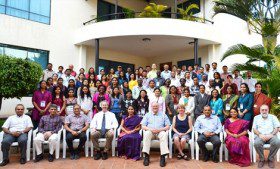Nutrition is crucial to global health. Emerging demographic, economic and dietary factors suggest that a large burden of preventable illness is poised to develop in India requiring training for a new cadre of Indian nutrition scientists. There is a great need for nutrition researchers in the country, but few training programs exist.
In response to this critical gap in training, the Bangalore Boston Nutrition Collaborative (BBNC) was initiated in 2009 to connect faculty at St. John’s Research Institute in Bangalore (SJRI) with colleagues at Harvard School of Public Health (HSPH) and Tufts University in Boston.
The Collaborative was designed to build capacity and to provide research training for young professionals in the fields of nutrition and global health from India, and subsequently other countries in the region.
Lead by Dr. Christopher Duggan, Associate Professor in the Department of Nutrition, HSPH, Director, Center for Nutrition at Boston Children’s Hospital, the BBNC was awarded the Obama-Singh 21st Century Knowledge Initiative award in 2013, an award that aims to strengthen collaboration and builds partnerships between American and Indian institutions of higher education in priority fields.
SAI supports the project, as its goals align with SAI’s own vision of interdisciplinary collaboration to seek innovative solutions to critical issues in South Asia.
Since 2010, the BBNC has provided over 100 students from India, Nepal, Pakistan, Bangladesh and Uganda with a unique global health education experience and an opportunity to explore new approaches and strategies to solve nutrition-based public health problems in an intensive two-week course in India.
“All of these graduates have returned to their home institution to work on advanced nutritional studies and programs, and many have junior colleagues that they are training,” said Duggan on the effect of the program. “We have an impact on research capacity building throughout the region.”
The most recent course took place from January 20 – 31, 2014, with 41 students in Bangalore. Participants included medical students, physicians and allied health professionals, as well as junior faculty in medicine, nursing, and public health at academic institutions throughout India. The course sessions were led by faculty from varying disciplines from SJRI and HSPH. Duggan said that the close interactions with faculty members were a highlight of the course.
The course allows students to gain substantive knowledge in topic areas related to public health nutrition research, including: clinical nutrition, physiology, biochemistry, and molecular nutrition. Students enhance their methodological skills in areas of nutritional, infectious disease, and chronic disease epidemiology, with emphasis on clinical, research, and laboratory areas.
The BBNC encourages students to continue their training after the course, and the BBNC website posts links to recordings of seminars held at HPSH.
Other Harvard faculty that have been involved in the course include Richard Cash, senior lecturer on global health, Ronald Bosch, senior research scientist in biostatistics, David Hunter, Vincent L. Gregory Professor in Cancer Prevention, Anuraj Shankar, senior research scientist in nutrition, and SV Subramanian, professor of population health and geography.
With support from the United States India Education Foundation, the Collaborative has secured 3 more years of funding, and hopes to continue its work in other countries, including Nepal and Uganda.
Portions of this article were been adapted from: Kuriyan et al. BMC Medical Education 2014, 14:5 http://www.biomedcentral.com/1472-6920/14/5
Christopher Duggan, HSPH, contributed to this article.

